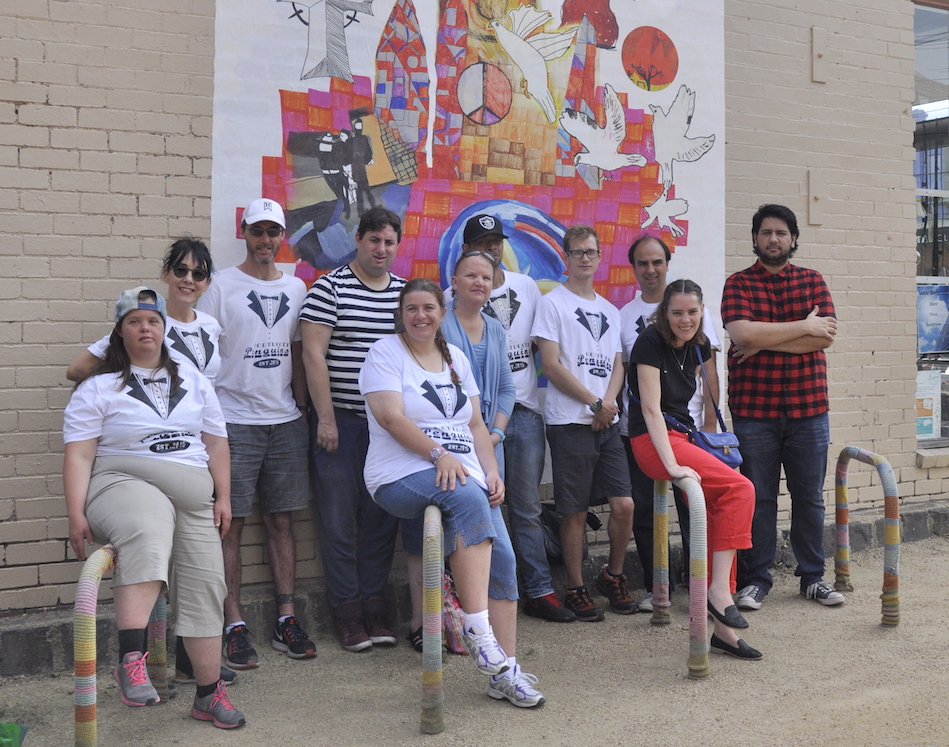Q&A: The Northcote Penguins on their inclusive art revolution

Melbourne art collective the Northcote Penguins are taking over MPavilion on Wednesday 28 November, 1–4pm, for Preliminary outline: Performance drawing, a workshop that invites you to collaborate with the Penguins and experience the act of drawing as a public performance. Ahead of the event, we caught up with the wave-making group to find out what inspired their formation and what needs to change in the contemporary art world to make it more accessible to those with “diffabilities”.
MPavilion: Who are the Northcote Penguins and how did the collective come about?
The Northcote Penguins: The Northcote Penguins is a group of seven artists and a facilitator that operate as part of a specialist program for professional practice at Arts Project Australia. The group came about in order to fulfil the need for greater exposure to art thinking, theory and making in the mainstream art world. The Northcote Penguins encourages teamwork and collective identity with no hierarchy, in order to further each individual’s art practice.
MPavilion: Collectives have been incredibly important to movements in art. Is there a drive to change the culture in or around contemporary art?
The Northcote Penguins: There is definitely a drive to change the culture in and around the world of contemporary art practice. The group advocates for the inclusion of voices produced outside of the formal education system. The group believes that people with a disability have something unique to add, but don’t want to be defined by their disability. By reflecting the world through their own subjectivity, they want to challenge assumptions about disability. One example of this is the Northcote Penguins’ advocacy towards changing the term ‘disability’ to ‘diffability’.
MPavilion: How has collaborating and working collectively influenced the art of the individuals in the group?
The Northcote Penguins: The Northcote Penguins’ exposure to art theory and practice by being part of a studio structure has promoted the cross pollination of ideas and, also, the artists have the provision of practicing artists and arts professionals supporting each unique project without the interference with the artists’ own objectives and methodology.

Northcote Penguin Amani Tia with mural.
MPavilion: Your event at MPavlion highlights drawing as a performance rather than a means to an end piece of work. Can you explain this idea?
The Northcote Penguins: The performance that will be presented is titled String Theory. The drawing is performed, and will convey the idea that art is never fixed but continually evolving in theory and practice. The key component of the work is about connection and shared ideas. Thus, the notion of drawing is taken as a metaphoric line; as a representation of the group dynamic as well as the outcome of ideas arising from this.
MPavilion: What can people expect when they drop into MPavilion during the drawing session?
The Northcote Penguins: During the performance drawing session, people can expect to see the Northcote Penguins seated face-to-face with each other, as they would normally sit each week around a table at Arts Project Australia. In order to reflect the group practice as each member adds to a discussion raised by a group member or the facilitator, a ball of wool will be passed to each member as they speak. This will physically manifest a ‘line of thought’—an extension of one thought to another—that will, by its very nature over time, construct a physical artwork of intersecting (wool) lines.
Join the Northcote Penguins for Preliminary outline: Performance drawing at MPavilion on Wednesday 28 November, 1–4pm.